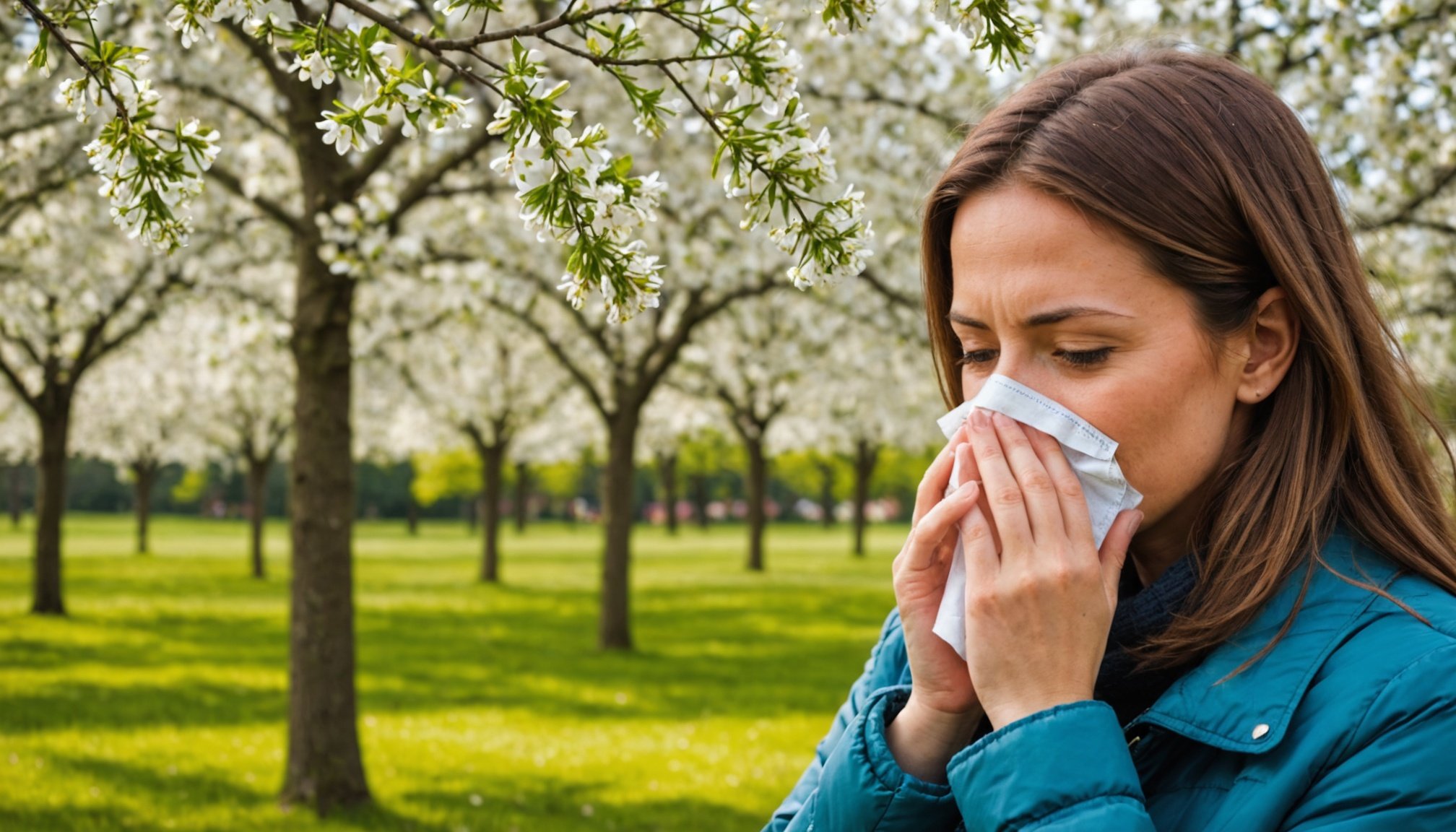Overview of Seasonal Allergies
Seasonal allergies, also known as allergic rhinitis, occur when the immune system overreacts to outdoor allergens like pollen. Common during specific times of the year, they are often triggered by mold spores, tree, grass, or weed pollen. Understanding allergies requires recognizing these common causes.
Allergy symptoms can vary in intensity and may include sneezing, itchy eyes, a runny or stuffy nose, and even fatigue. They happen when your immune system identifies a generally harmless substance as a threat, prompting the release of chemicals like histamines. During allergy season, these symptoms can be more intense and affect everyday activities.
Also to discover : Top Strength Training Workouts to Combat Osteoporosis in Women: Your Ultimate Guide
Identifying trigger factors is crucial in managing seasonal allergies effectively. This could involve tracking pollen counts in your area and avoiding outdoor activities when levels are high. Recognizing these factors helps in reducing exposure and minimizing symptoms.
Recognizing and reducing contact with triggers can significantly alleviate discomfort. Employing solutions like air filters or mask usage during high pollen seasons can further aid symptom management. Understanding the specific allergies that affect you is the first step towards proactive care and relief.
In parallel : Top Home Remedies to Soothe Eczema Flare-Ups: Natural Solutions That Work
Effective Over-the-Counter Medications
Selecting the right allergy medications can greatly alleviate symptoms. When it comes to over-the-counter options, you’ll typically encounter antihistamines and nasal sprays. Antihistamines, such as loratadine and cetirizine, work by blocking histamine, a substance your body produces during an allergic reaction. They are highly effective for symptom relief but might cause drowsiness in some people.
Nasal sprays can deliver targeted relief, particularly for nasal congestion. Saline sprays can help moisten the nasal passages, whereas steroid nasal sprays reduce inflammation. Consider these when symptoms like a runny nose or congestion dominate your allergy experience.
Here are a few guidelines for selecting the right medication:
- Assess your symptoms: Different medications target different symptoms, so knowing your primary complaints is vital.
- Check for potential side effects: Some antihistamines are non-drowsy, while others aren’t.
- Consider existing health conditions: Always review medication labels, especially if you have health concerns or are taking other medications.
Overall, understanding the types of medications available and the guidelines for selecting them will enable you to manage your allergies effectively while minimizing potential side effects.
Natural Remedies and Home Treatments
Exploring natural allergy relief can provide an accessible, holistic approach to managing symptoms. Utilising common herbs, such as stinging nettle and butterbur, may help alleviate difficulties. These herbs have been traditionally used to soothe respiratory issues and reduce inflammation, potentially easing allergy discomfort.
Switching to practical home remedies is another path worth considering. For instance, using a saline nasal rinse can effectively clear allergens from the nasal passages, providing a refreshing reprieve. Regularly cleaning living spaces and washing bedding can also significantly lower allergen levels, offering a comfortable environment.
Herbal treatments for allergies often prompt the question: how effective are they? While studies suggest some promise, the scientific community remains divided. Research shows that while these remedies can be beneficial for some, results may vary between individuals. It is advisable to proceed with caution and consult a healthcare professional before initiating any new treatment.
This home-focused and evidence-evaluated approach encourages individuals to experiment thoughtfully, balancing both traditional and modern methods. By doing so, they can discover what best alleviates their personal symptoms in a natural, side-effect-free manner.
Environmental Controls for Reducing Allergens
In the pursuit of effective allergens management, maintaining optimal indoor air quality is paramount. These two factors are intertwined and essential for allergy prevention, particularly when considering common household nuisances like dust, mold, and pet dander.
A significant step involves regular cleaning. Dust accumulates invisibly yet persistently on surfaces, often harboring mites and other allergens. Vacuuming with a HEPA filter mitigates this problem, as these filters trap particles invisible to the human eye.
Additionally, mold thrives in damp environments, posing a challenge for maintaining indoor air quality. Creating a dry environment is crucial; this can be achieved by employing dehumidifiers which reduce moisture levels, thereby limiting mold growth.
Pet owners face the frustration of dealing with pet dander. One doesn’t have to say farewell to furry companions; instead, strategic cleaning and grooming can go a long way. Frequently washing pet bedding and brushing pets outside can help manage allergens effectively.
Further, investing in air purifiers with HEPA filters is advisable. They capture airborne pollutants, making the air cleaner and safer. Regular maintenance of these devices is necessary to ensure their optimal performance in trapping unwanted particles.
Lifestyle Changes to Manage Allergies
Allergy management requires effective lifestyle adjustments to reduce symptoms and improve overall health. One significant factor is diet and nutrition. Incorporating more omega-3 rich foods, such as salmon and walnuts, can reduce inflammation and alleviate allergic reactions. Limiting processed foods and sugars also boosts the immune system’s strength.
Beyond nutrition, regular exercise plays a pivotal role in health. It’s essential for boosting immunity and alleviating allergy symptoms. Activities such as jogging, yoga, or swimming can provide relief, ensuring a balance of cardio and relaxation. Additionally, maintaining a routine helps the body stay resilient against allergens.
Equally important is adopting a proactive approach during allergy season. Begin these lifestyle changes early to prepare your body ahead of allergens peaking, reducing the severity of symptoms once they occur. Regularly cleaning living spaces and keeping windows closed on high pollen days can further mitigate exposure.
Incorporating these health tips into daily life not only assists allergy management but enhances your overall well-being. Simple yet strategic steps can lead to substantial improvements in managing allergies effectively, offering relief and fostering a healthier lifestyle.
Expert Insights and Recommendations
Navigating allergies can be challenging, but allergy experts offer valuable guidance. According to Dr. Jane Thompson, a leading allergist, understanding your specific triggers is crucial. “Awareness allows for proactive avoidance,” she states. She also emphasizes the importance of consulting with specialists, “Professional advice can significantly improve management strategies.”
Health professionals also provide evidence-based guidelines to alleviate symptoms. For instance, Dr. Michael Lee suggests air purifiers as essential tools for reducing indoor allergens. “They’re effective at trapping particles like pollen and dust mites,” he explains. Further, consistent cleaning and maintaining a hypoallergenic environment can greatly reduce exposure.
Experts encourage individuals to engage in personal evaluation. Dr. Emily Clark, an immunologist, recommends keeping a symptom diary. “Documenting reactions helps identify patterns and triggers,” she advises. It is a practical step prior to seeking expert professional advice. Regular consultation ensures nuanced insights and tailored solutions for each individual’s unique situation.
For effective symptom relief, consider adopting these health tips:
- Invest in allergy-proof mattress covers
- Regularly wash bedding in hot water
- Opt for synthetic fibre pillows
By integrating these strategies, individuals can better manage and alleviate allergy symptoms while pursuing specialist consultation for comprehensive care.
Actionable Checklists and Resources
Navigating the world of allergies can be daunting, but a personalized allergy relief plan could be your guiding light. Having a tailored approach helps you manage symptoms effectively, offering you a reprieve during allergy season. Start by identifying common triggers and consult allergy resources to stay informed.
Creating a symptom relief checklist is crucial. This checklist can encompass various actionable tips:
- Monitor pollen counts daily through reliable weather apps.
- Use air purifiers to reduce indoor allergens.
- Regularly wash bedding and clothes to remove pollen residues.
For ongoing management, finding useful resources is vital. Many online platforms offer comprehensive allergy management guides tailored for individual needs. From newsletters to educational webinars, these resources empower you to stay updated with the latest allergy treatments. Support groups available through forums can also provide emotional support and practical advice.
During allergy season, summarise the practical steps through your checklist. Stick to maintaining a clean environment, taking prescribed medications, and keeping open communication with healthcare professionals. These consistent practices will ensure you mitigate allergy symptoms effectively, giving you relief and peace of mind.











